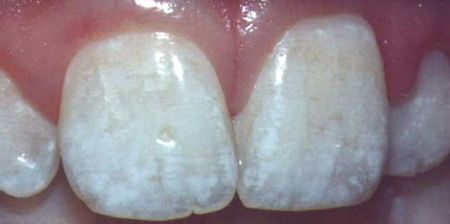
Fluoridation plays a role in preventing carious lesions in baby teeth and remineralising early lesions. Fluoride administered directly to milk teeth contributes to the post-euptive maturation of enamel and remineralisation following acid attacks. Fluoride also contributes to lowering the viscosity of saliva and thus reduces plaque formation.
The controlled use of fluoride has shown that it is the only microelement currently known to play an important role in preventing dental caries. Fluoridation carried out in the dentist's office is local fluoridation and consists of applying fluoride in the form of varnishes or gels directly to the surface of the teeth. The preparations used for fluoridation in the dental surgery contain a much higher concentration of fluoride than that in toothpaste or mouthwash.
Fluoridation is performed only after the tooth surfaces have been properly sanitized by scaling and professional brushing and is recommended:
- each child - under 4 years of age fluoride varnishes are applied, over 4 years fluoride gels
- children at high risk of caries and those with dental dystrophies
- in wearers of dental appliances
- in certain diseases that cause decreased salivary flow
After fluoridation the child should not rinse or consume food and liquids for at least 30 minutes to allow the tooth to absorb the fluoride and help repair microscopic carious lesions. Depending on the state of oral health it is recommended to return for fluoridation every 3, 6 or 12 months.
 RO
RO  EN
EN 